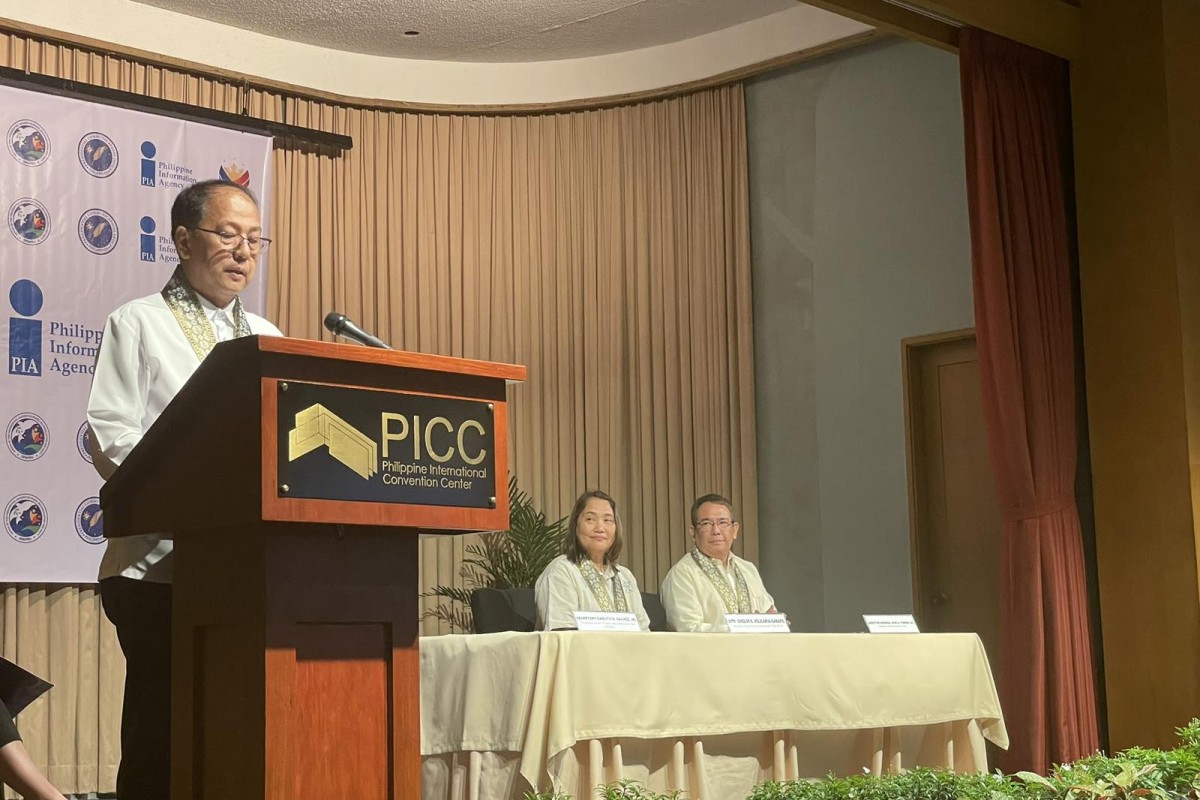The Office of the Presidential Adviser on Peace, Reconciliation and Unity (OPAPRU) forges a partnership with the Presidential Communications Office (PCO) and Philippine Information Agency (PIA) to boost the national government’s information campaign on its anti-insurgency and peacebuilding efforts in the country. The collaboration was formalized through a Memorandum of Agreement signed by Presidential Peace Adviser Secretary Carlito G. Galvez, Jr., Presidential Communications Office Secretary Atty. Cheloy E. Velicaria-Garafil, and Philippine Information Agency Director-General Jose A. Torres, Jr. at the Philippine International Convention Center on Wednesday, August 30. (PIA-NCR file)
CALOOCAN CITY, (PIA) -- The Office of the Presidential Adviser on Peace, Reconciliation and Unity (OPAPRU) is set to embark on a transformative journey, empowered by a substantial budget increase of P7 billion for the fiscal year 2024. Secretary Carlito Galvez, Jr., at the helm of OPAPRU, revealed that this budgetary boost will serve as a cornerstone for advancing the peace agenda of the Marcos administration and improving the quality of life for Filipinos impacted by conflict.
The momentous announcement came following the approval of the P7 billion proposed budget for OPAPRU and the National Amnesty Commission (NAC) by the Senate Committee on Finance, led by Senator Ronald "Bato" dela Rosa, on September 20.
Secretary Galvez emphasized the significance of this financial commitment, "This budget is a peace investment because once all the signed peace agreements are fulfilled under the Marcos administration, we could all enjoy a more peaceful and more developed Bagong Pilipinas."
In a remarkable contrast to previous years when OPAPRU operated with a modest budget averaging P800 million, this funding infusion heralds a new era of possibilities for the agency. Notably, a significant portion of the budget allocation comprises fund transfers to partner agencies, including the Department of Social Welfare and Development, Armed Forces of the Philippines, Philippine National Police, Philippine Statistics Authority, Department of Agriculture, and recipient local government units (LGUs). These funds are earmarked to facilitate critical deliverables, such as the decommissioning of Moro Islamic Liberation Front (MILF) combatants, confidence-building initiatives, and limited social protection projects.
In addition to the P7 billion budget, Secretary Galvez has also requested an additional P800 million budget allocation to address the agency's unfunded priority requirements. This includes provisions for the NAC, essential transitional cash assistance to complete the decommissioning of 40,000 MILF combatants, and support for peace education programs.
A significant facet of OPAPRU's unfunded priority initiatives is the operationalization of the NAC, a move actively advocated by President Ferdinand R. Marcos Jr. Created under Executive Order 125 in 2021, the NAC is charged with the responsibility of receiving and processing applications for amnesty filed through the Local Amnesty Board.
Secretary Galvez emphasized the government's commitment to address the socio-economic factors that drive recruitment and rebellion while preventing renewed conflict and encouraging members of rebel groups to reintegrate into society.
"We will fund (for 2024) the P5 billion PAyapa at MAsaganang PamayaNAn (PAMANA) projects that have been restored to OPAPRU to deliver on the socio-economic interventions to ensure changed lives and transformed communities," he asserted.
The national government's PAMANA Program, championed by OPAPRU, is instrumental in supporting peace negotiations and contributing to the overarching goal of achieving a just and enduring peace for all Filipinos and the nation as a whole. PAMANA projects, implemented in partnership with national line agencies and LGUs, encompass a wide range of initiatives, including agriculture productivity support, infrastructure development such as bridges, roads, and water systems, all aimed at uplifting conflict-affected and vulnerable communities that have long been marginalized in terms of economic progress.
As the OPAPRU enters a new era of transformation, the promise of a more peaceful and prosperous future for Filipinos impacted by conflict becomes increasingly tangible. (PIA-NCR)



